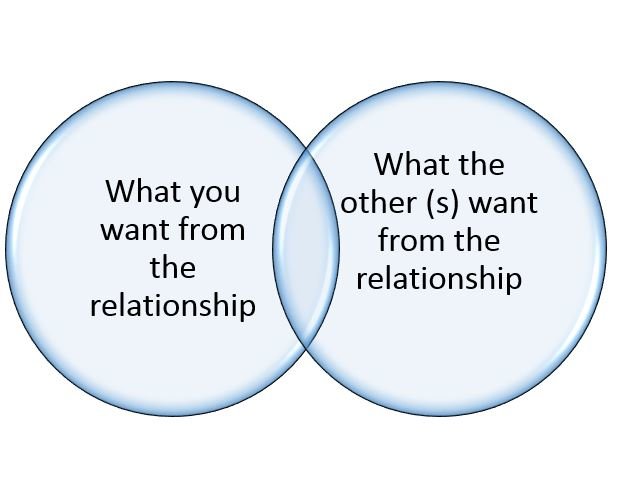Better Work Relationships
Better Work Relationships
Building better relationships with others is important, because both your professional life and your personal life, depend on how well you get on with others.
Developing your ability to create and maintain excellent relationships will help you enjoy more success in every aspect of your life.
So, the question we need to answer is: "How can we create and sustain better relationships with others?"
The answer is simple: look at this diagram.

Although there are many kinds of relationships we have with others; business relationships, work relationships, loving relationships, family relationships, etc, they all can be explained by a single underlying truth.
Relationships exist because there is a perceived Common ground of mutual self-interest between the people in the relationship. And it is that Common ground of mutual self-interest that is the basis of the relationship.
Think about it.
- In a business relationship, the common ground is the trading of some service between the seller and the buyer.
- In a work relationship, the common ground is the cooperative effort to achieve the organisation's goal.
- In a loving adult relationship, the common ground is the mutual fulfilling of each other's emotional needs.
- In a family relationship, there is so much common mutual interest that we could talk about it all day. If your family life is good, then everyone wins.
The key concept is this: In order to have good relationships you need to find and develop the Common Ground of Mutual Self-interest that exists between you.
And to do that, you need to know two things:
- What you want from the relationship.
- What the other person (people) wants from the relationship.
Most people instinctively know what they want from a relationship and they focus their attention on trying to get it.
But what many people DON'T focus on is; what the OTHER person wants from the relationship.
Because they don't focus on finding out what the other person wants, they also don't focus on HOW to give it to them.
Most people are trying too hard to TAKE what they want from a relationship, without thinking much about giving what the other person wants.
So there are three basic ways to fail in a relationship:
- One person does all the taking, and does not give enough to the other (one person is overly selfish).
- Both people try to take too much and both try to give as little as possible in return (both are overly selfish).
- Person A gives too much to person B, but fails to ask for anything in return. Some people are overly altruistic; meaning some people give and give and give again, without ever asking for anything in return. These people sacrifice their own self-interests to the other person and therefore the relationship is lopsided. One is doing all the giving.
In order for a relationship to last, then BOTH parties must be gaining. Both are giving and both are taking. There is what I call, 'A mutual exchange of value' taking place between the people in the relationship.

All successful relationships boil down to this: a mutual exchange of values based upon a common interest.
In a successful relationship, everyone wins. Nobody is losing out to the other. Both are better off for being in the relationship.
The moment that one person FEELS he or she is worse off for being in the relationship, than they would have been if they were NOT in the relationship, then that relationship is in jeopardy.
The moment one person feels they are NOT getting out from a relationship what they are putting in, then the relationship is inequitable. When one person feels things are unjust, they start to look for ways to get out.
If you want better relationships with others, then do this:
- Decide what you want from the relationship and communicate it to the other person.
- As a matter of urgency, find out what the other person wants from you in this relationship.
- Focus your efforts on making sure you understand the needs of the other person and make serving the other person's needs your priority.
- DON'T focus too much energy on trying to take out from the relationship, more than you are putting in.
- On the other hand, ensure that the other person is giving you want you want too. This is a mutual exchange of values: There MUST be two-way traffic.
You give to them, they give to you. You give to them, they give to you.
I sometimes hesitate to use the next phrase, but it is true: All successful relationships are trading relationships.
There is a fair trade between both parties: where both parties are giving and receiving in more or less equal measure.
So, make sure you are giving and receiving in fair measure. That way your relationships will last forever.
"Givers need to set limits because takers rarely do". Henry Ford
Definition: Mutual exchange of value
Mutual exchange of value is a workplace principle where two or more people each give and receive useful help, goods or support in a way that all sides judge as fair. The relationship lasts only while every person offers value, gains value, sees the swap as even and joins in by choice.
Show CG4D Definition
- Involves two or more people
- Each person both gives and gains something useful
- The items or help exchanged hold recognised value for all sides
- All parties view the swap as fair and enter it freely
Article Summary
Better work ties form when you state what you want, learn what others need, and match give with take; this clear, fair swap lifts trust, cuts conflict, and lets every side win.
Frequently Asked Questions
Here are some questions that frequently get asked about this topic during our training sessions.
What is the common ground of mutual self-interest?
How do I find out what my coworker wants from our relationship?
Why do relationships fail when one person gives too much?
What does a fair value exchange look like at work?
How can clear communication improve work relationships?
How do I balance give and take without feeling used?
What first step should I take to build better relationships?
Thought of something that's not been answered?
Did You Know: Key Statistics
Gallup’s 2024 workplace report finds that teams with close bonds post 21% higher profit and 41% fewer days off than teams with weak bonds. A 2024 CIPD survey shows 72% of UK staff who say talks with their boss are clear feel highly keen at work, while only 18% feel the same when talks are poor.Blogs by Email
Do you want to receive an email whenever we post a new blog? The blogs contain article 5-10 minutes long - ideal for reading during your coffee break!
Further Reading in Communication - Clear Communication
-
Success Through Communication
Develop clear communication skills to share facts, feelings and vision. Use words, tone and body language to lift teamwork, cut errors and speed up success.
Read Article > -
Communication Skills for Sales People
Boost revenue by sharpening communication skills. Learn need analysis, objection handling, negotiation and closing techniques in our training guide. Act today.
Read Article > -
Communication Methods
Learn why communication skills training hinges on objective language. Drop emotive red-rag words, listen well and win cooperation, time and staff engagement.
Read Article > -
Communication Skills in Business
Learn why feedback in business boosts performance and how to give constructive criticism, avoid destructive remarks and use praise to inspire engaged teams.
Read Article > -
How to improve the way I speak
Learn how to speak clearly at work, avoid ambiguity and give clear instructions. Follow four practical steps to boost workplace communication and cut errors.
Read Article >
Looking for Communication Skills Training?
If you're looking to develop your Clear Communication Skills, you may find this Communication Skills Training Course beneficial:
Open Training Course Pricing and Availability
Next Open Course Starts in 11 days, Leeds City, places available







